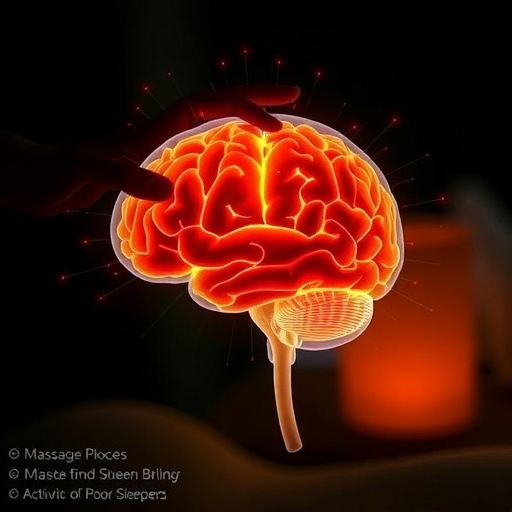Recent scientific investigations have continuously explored the efficacy of complementary therapies in enhancing mental health and cognitive function. Among these studies, a notable randomized controlled trial has emerged, highlighting the effects of massage therapy on daytime brain activity and arousal levels of poor sleepers. This research, conducted by a team of scientists including Ntoumas, Karatzaferi, and Boubougiatzi, has provided intriguing insights into the multifaceted interactions between physical touch and neurophysiological responses.
The ramifications of insufficient sleep extend beyond mere fatigue, influencing various cognitive processes and emotional stability. While many individuals recognize the importance of a good night’s rest, the complexities surrounding sleep disorders continue to challenge both healthcare providers and the general populace. The authors of the study embarked on a quest to uncover alternative modalities that could potentially alleviate the burdens of sleep deprivation. Given massage therapy’s long-standing reputation for promoting relaxation and well-being, the researchers aimed to determine its impact on individuals who struggle with sleep quality.
Through meticulous methodology, the team recruited participants who reported chronic sleep issues. These individuals were subjected to a comprehensive assessment that measured their baseline cognitive and physiological responses. Following this initial evaluation, participants were randomized into two groups: one that received massage therapy and another that served as a control. Over the duration of the study, participants engaged in regular massage sessions, allowing the researchers to track changes in brain activity and overall arousal states.
The findings of this research illuminated a significant correlation between massage therapy and enhanced daytime brain activity. Not only did participants undergoing massage report feelings of relaxation, but neuroimaging techniques revealed increased activity in regions of the brain associated with cognitive functions and emotional regulation. This suggests that massage therapy may serve as a practical intervention to stimulate neural pathways that are often subdued in poor sleepers.
Moreover, the trial’s data indicated a marked reduction in arousal states among participants receiving massage. Elevated arousal levels are frequently linked to stress and anxiety, conditions that plague a substantial portion of the population suffering from sleep disturbances. By addressing these heightened states, massage therapy presents a multifaceted approach to not only improve sleep quality but also to enhance overall psychological well-being.
In juxtaposition to pharmacological interventions that often entail unwanted side effects, massage therapy emerges as a non-invasive alternative with minimal risks. The gentle application of pressure through massage techniques promotes the release of endorphins and other neurotransmitters that contribute to feelings of happiness and relaxation. This reinforces the idea that our physical and mental health are deeply intertwined, making the case for more integrative approaches to treatment.
Understanding the mechanisms behind the benefits of massage is crucial. Through the activation of the parasympathetic nervous system, massage therapy facilitates a state of rest and recovery. This physiological response is characterized by decreased heart rates, lower blood pressure, and heightened feelings of safety and relaxation—all crucial components for preparing the body for restorative sleep. The neurobiological underpinnings of this process underscore the potential of gentle physical therapies to influence brain activity positively.
The implications of this study reach far beyond individual wellness. With an ever-increasing number of people affected by sleep-related issues, the healthcare system stands to benefit significantly from addressing these problems through non-traditional means. As massage therapy gains traction within medical communities, its integration into holistic health frameworks could offer new preventative measures against the escalation of sleep disorders.
Additionally, public health initiatives aimed at educating individuals about self-care practices can catalyze widespread acceptance of massage therapy as a legitimate intervention. By fostering a culture that values alternative therapies, individuals may feel more empowered to take charge of their health, turning to options like massage therapy to alleviate stress and improve sleep quality.
Importantly, as research on this topic continues to evolve, further studies will help clarify the long-term benefits and potential limitations of massage therapy. A deeper understanding of individual variabilities, including personal preferences in touch and the context of the therapeutic environment, will enhance the applicability of these findings in diverse populations.
In conclusion, the randomized controlled trial spearheaded by Ntoumas, Karatzaferi, and Boubougiatzi underscores the profound effects of massage therapy on both mental health and cognitive functioning, particularly for individuals grappling with poor sleep. The study not only opens new avenues for treatment but also reinforces the interconnectedness of mind and body. As society progresses towards embracing holistic approaches to health, the role of therapies like massage may become increasingly prominent in fostering overall well-being and cognitive enhancement.
The authenticity of the results presented in this trial beckons further exploration and dialogue within both scientific and public health realms. Ultimately, as awareness spreads and the benefits of this ancient practice are validated through rigorous research, we may very well witness a paradigm shift in how sleep disorders are understood and treated.
Subject of Research: The impact of massage therapy on daytime brain activity and arousal levels in individuals with sleep disturbances.
Article Title: Massage positively influences daytime brain activity and reduces arousal state in poor sleepers: a randomized controlled trial.
Article References:
Ntoumas, I., Karatzaferi, C., Boubougiatzi, F. et al. Massage positively influences daytime brain activity and reduces arousal state in poor sleepers: a randomized controlled trial.
BMC Complement Med Ther 25, 290 (2025). https://doi.org/10.1186/s12906-025-05022-6
Image Credits: AI Generated
DOI: 10.1186/s12906-025-05022-6
Keywords: Massage therapy, sleep disorders, daytime brain activity, arousal levels, mental health, neurophysiology.
Tags: alternative therapies for sleep disorderschronic sleep issuescognitive function improvementcomplementary therapies for cognitive healthdaytime brain activity enhancementeffects of massage on poor sleepersemotional stability and sleepmassage therapy benefitsmental health and relaxationphysical touch neurophysiologyrandomized controlled trial on massagesleep deprivation solutions





